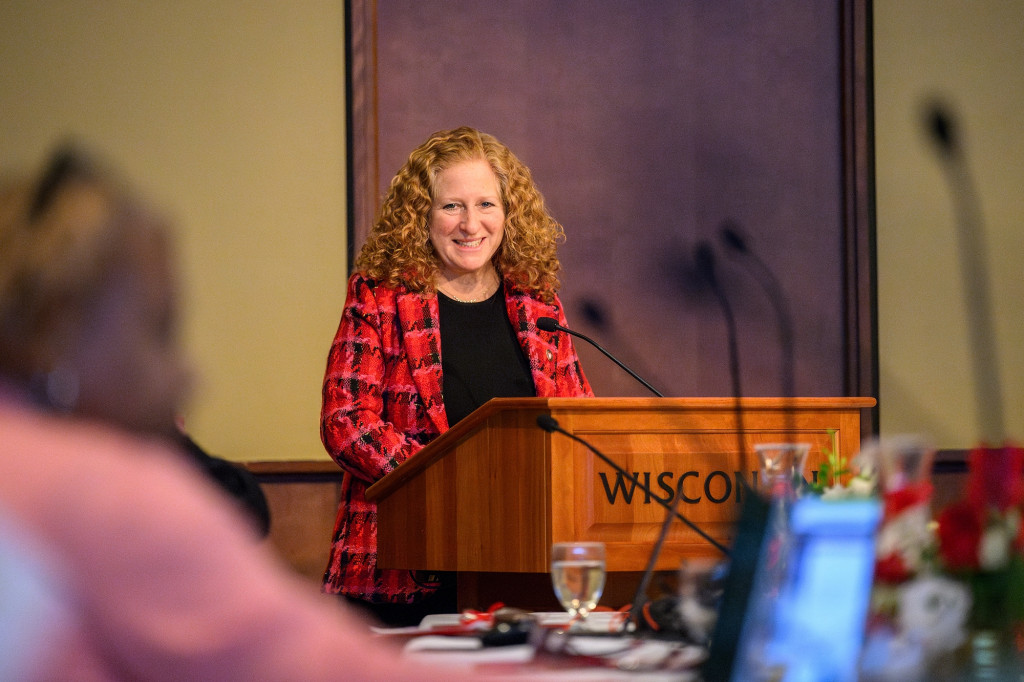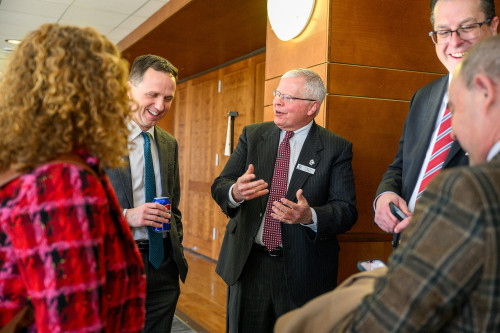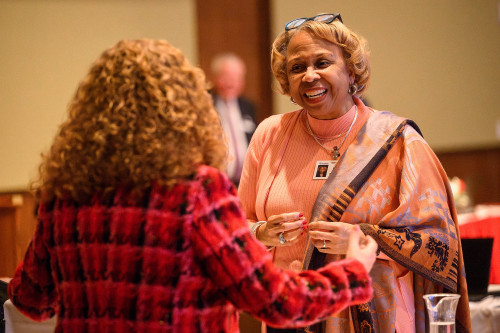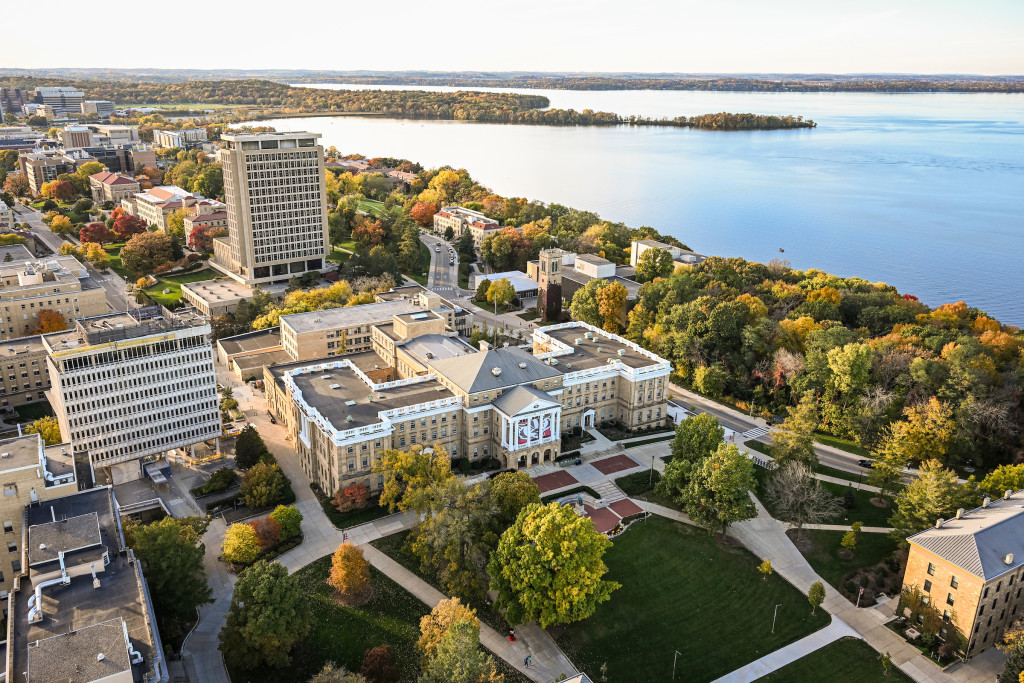Chancellor Mnookin chronicles a “momentous year” for UW–Madison, despite challenges

Chancellor Jennifer Mnookin delivers a speech at the UW Board of Regents meeting hosted by UW–Madison at Union South on Feb. 6. During the speech titled “Growing UW–Madison’s Future,” Mnookin talked about the principle of “planting trees under whose shade you do not expect to sit.” Photo: Althea Dotzour
The University of Wisconsin–Madison is coming off a milestone year, from a rise in national research rankings to significant progress on important building projects that will modernize classroom and lab spaces to exciting growth in campus initiatives using emerging technologies.
To keep that momentum, UW–Madison must stay flexible and adaptable, with an eye on the long game.
That was UW–Madison Chancellor Jennifer L. Mnookin’s message Thursday, Feb. 6, delivered to the Universities of Wisconsin Board of Regents meeting at Union South.
“We have had a momentous year with an enormous number of achievements that are building on our excellence and setting the stage for a truly exciting next chapter,” Mnookin said, while acknowledging challenges facing UW–Madison and higher education broadly.
Mnookin touted the campus-wide RISE initiative, which encompasses three main areas of study – artificial intelligence, sustainability and health – to tackle grand challenges facing Wisconsin and the world. Announced last year, RISE is already spawning new collaborations among faculty who may not have worked together in the past, Mnookin said.
One example is a collaboration between the School of Pharmacy and the School of Medicine and Public Health to find new ways to treat pancreatic cancer. In another project, faculty in radiology and biomedical engineering are using AI to examine lethal brain tumors.
To date, 30 faculty have been hired through RISE and an additional 15 are committed for next year, with a goal of hiring 120-150 new faculty as part of the initiative.
“Our culture draws great people here,” Mnookin said. “They work with outstanding current faculty to push the institution forward, and that draws more great minds here to Wisconsin who accelerate discovery and ultimately fuel the state’s economy. It’s a win-win and it’s the Wisconsin Idea in action.”
Overall, between 2019 and 2023, the university’s research expenditures leapt from $1.3 billion to $1.7 billion. That growth resulted in UW–Madison rising from 8th to 6th in the National Science Foundation’s HERD rankings. Nearly half of UW’s total research expenditures come from federal awards.

At the UW Board of Regents meeting hosted by UW–Madison, Chancellor Mnookin speaks with a group that includes (at center) Jay Rothman, president of the Universities of Wisconsin. Photo: Althea Dotzour
The achievements and growth continue against a backdrop of challenges created by recent executive orders and directives around federal funding for research. Mnookin said the long-held mission and values of UW–Madison will guide the university through the shifting landscape.
“We do not know at this point how the new administration’s policies might affect these federal grants going forward, though we can assume that there may well be a loss – and perhaps a substantial loss – of federal dollars,” Mnookin said. “Our responsibility, over the weeks and months ahead, will be to ensure we’re taking appropriate actions to comply with federal laws while also preserving our mission and, simultaneously, staying true to our core commitments, including our commitments to evidence-based research; to freedom of speech and academic freedom; to fearless sifting and winnowing; to supporting fairness, opportunity, and the respect for the human dignity of all members of our community.”
The campus environment must be a place where students can engage each other with curiosity and respect and listen to each other even when they disagree, Mnookin added. A diversity of viewpoints is essential to making good on the promise that students of all backgrounds, beliefs and identities can thrive at UW–Madison.
“One of the things I value deeply about big, complicated universities like ours is their wonderful plurality,” Mnookin said. “There are very few places on earth where so many different ways of seeing the world come together in an intentional way.”
Mnookin says it’s imperative that a diversity of viewpoints is heard on campus, whether it’s invited speakers, debates or other engagement opportunities. For example, UW–Madison has doubled the size of the Deliberation Dinners program, which brings students together over a meal to have productive discussions about controversial issues.
“It’s a mistake to view diversity through just one or two lenses,” she said. “Our pluralistic excellence requires many kinds of diversity.”

At left, Chancellor Mnookin speaks with Regent Dr. Joan M. Prince during a Board of Regents meeting. Photo: Althea Dotzour
To advance the university’s mission of teaching, research and service, UW–Madison is making strides in modernizing its facilities. For instance, Irving & Dorothy Levy Hall, set to open in 2026, is the first new academic building for humanities departments within the College of Letters & Science in more than 50 years.
Demolition begins in April to make way for the new, state-of-the-art Phillip A. Levy Engineering Center which is slated for completion in 2028. And Morgridge Hall, the new home of UW–Madison’s School of Computer, Data and Information Sciences, will open this fall.
The Frautschi Center, a ‘front door’ to the Lakeshore Nature Preserve and a living laboratory and classroom, is expected to be completed in late 2026.
This spring, UW–Madison, in partnership with the Universities of Wisconsin, will continue to advocate for increased investment in higher education, with the goal of changing Wisconsin’s status of 43rd out of the 50 states in the measure of state investment.
“UW–Madison has been a jewel of our state for 176 incredible years, and I want the UW–Madison of seven years from now – of 17 years from now — and yes, even of 176 years from now, to be even stronger than it is today,” she said.
Read the chancellor’s full remarks as prepared or watch a video of her speech.

The UW–Madison campus. Photo: Jeff Miller
Tags: chancellor




